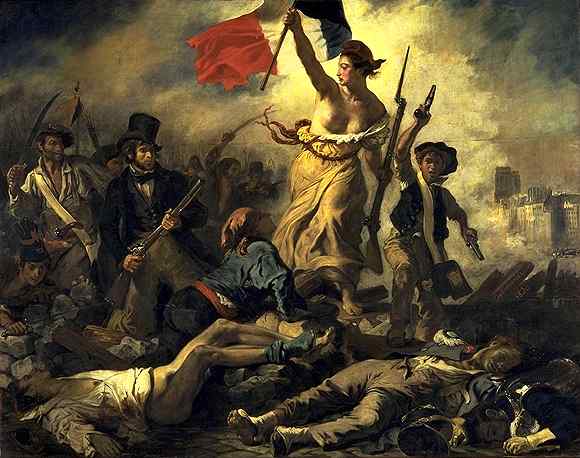Seton Hall University Honors ProgramHONS 2104 AAColloquium onContemporary CivilizationsSpring 2001February 27, 2001 version |
 |
|---|
Seton Hall University Honors ProgramHONS 2104 AAColloquium onContemporary CivilizationsSpring 2001February 27, 2001 version |
 |
|---|
| Expectations and Assignments | Course schedule | Art Gallery | Reading List | Class Discussions |

Professors:
Dr. Petra t.D. Chu:
Dr. Judith C. Stark:
| Top of page |
|
Romanticism 1815-1848 Introduction to the course; discussion of the "modern world" and its principal features. Discussion of assignments. Europe after 1815 |
|
Romanticism 1815-1848 The Romantics and Nature Enlightenment to Romanticism: the limits of reason; questions about God and religious faith; epistemological revolutions: empiricism, rationalism, and Kant's "Copernican Revolution."
Background readings:
|
|
Romanticism 1815-1848 Romanticism and the preoccupation with history
Utilitarianism, liberalism and individual freedom
Background readings:
|
|
Romanticism 1815-1848 Science, progress and the Industrial Revolution The textile industry and the beginnings of mass production |
|
Revolution of 1848 Developments in capitalism
The Revolution of 1848 Background reading:
|
|
Revolution of 1848 Rise of the media and popular culture Karl Marx, The Communist Manifesto
|
|
1848-1870: Progress and Discontent Literary responses to industrialization
Artistic responses to industrialization
Background reading:
|
|
1848-1870: Progress and Discontent The place of women in the nineteenth century
|
|
1870-1900: Opulence and Decadence The lure of/discontent with ruban life: Impressionism, Post-Impressionism, Symbolism
Background reading:
|
|
1870-1900: Opulence and Decadence Philsophy's critique of culture; decadence and democracy; transvaluation of values
|
|
1870-1900: Imperialism and
Colonization Imperialism: the Reach of the European Powers Imperialism and the world fairs Readings:
|
|
1870-1900: Imperialism and
Colonization Imperialism and the colonization of Africa
|
|
The collapse of tradition Midterm Exam 1900-1914: Art, Music, Literature: the collapse of Readings:
|
| 2/27 | The collapse of tradition The medical model of mental life and mental disorders
|
| 3/1 | World War I and the 1920s World War I (guest lecture)
Readings:
|
| 3/6 | World War I and the 1920s Dadaism
|
| 3/8 | The Inter-War period: 1920s and 1930s Responses to World War I: Changing roles of women
Surrealism
Reading:
|
3/13 3/15 |
Spring Break - No classes |
|
The Inter-War period: 1920s and
1930s The Great Depression American painting between the wars |
|
World War II and aftermath Totalitarianism, State Terror and the Holocaust Viewing of "degenerate Art"
Reading:
|
|
World War II and aftermath Cultural Responses to WWII: Abstract Expressionism |
|
Russia and the Cold War The bi-polar world and the arms race
Reading:
|
|
Russia and the Cold War The Russian Avant-garde and social realism
|
|
The 1960s and 70s Cultural Revolution in China
Readings:
|
|
The 1960s and 70s The Environmental Movement
|
| 4/12 | Holy Thursday - University Closed |
|
The 1960s and 70s Cultural upheavals in the sixties; the role of the media Pop Art Reading:
|
|
The 1960s and 70s The Women's Movement
Feminism in the arts |
|
The new world order and
globalization
Reading:
|
|
The new world order and globalization |
4/30 |
Final Examination 12:45 pm
|
| Top of page |
Required Texts
Arendt, Hannah. Eichmann in Jerusalem. Viking/Penguin.
Conrad, Joseph. Heart of Darkness. Dover.
Davis, Rebecca Harding. Life in the Iron Mills. Feminist Press.
Dostoevsky, F. The Grand Inquisitor. Hackett.
Findley, Timothy. The Wars. Penguin/Canada.
Freud, Sigmund. Five Lectures on Psychoanalysis. Norton.
Kafka, Franz. The Trial. Norton.
Marx, Karl. The Communist Manifesto. Bantam Classics.
Min, Achee. Red Azalea. Mass Marketing Reprint.
Woolf, Virginia. A Room of One’s Own. Harcourt Brace.
On Reserve in the Library
Two standard history texts are on reserve for your use. You are required to read the chapters that are correlated to the material each week.
Kishlansky, M. et al. Societies and Cultures in World History. Vol 2, Harper Collins (abbreviated in the syllabus as SC).
Craig, Albert et al. Heritage of World Civilizations. Vol. 2, Prentice Hall, 1999 (abbreviated in the syllabus as HWC).
| Top of page |
Class Attendance
Regular and punctual attendance is required. Since one class period is equivalent to a week’s work in a three-credit course, absence from class is tolerated only for the most serious reasons. If an absence from class is unavoidable, please notify Dr. Stark as soon as possible. Also, please plan ahead for attendance at any scheduled extra-curricular events and trips. Your presence on these occasions is expected and essential.
Academic Integrity
Any instance of cheating, plagiarism, or otherwise representing the words or work of others as your own is a violation of honesty and academic integrity and will render the student liable to serious penalties.
Term Paper Assignment
You may choose any topic (event, person, texts, ideas, art works, themes, questions, social movements) related to the course. You must discuss your topic and receive approval for it from Dr. Chu or Dr. Stark. Length 12-15 pages.
Dates for assignments:
Feb. 15: submission of topic and preliminary bibliography
March 8: outline
March 29: draft (at least one major section of your paper)
April 19: final paper due
New York Times Book Review
Every Tuesday morning we will spend the first 15 minutes reviewing 2 book reviews relating to some aspect of the course. Students will do this in pairs.
Grading Procedures
Dr. Petra Chu (Art and Music) and Dr. Judith Stark (Philosophy) are the lead professors for the course. Professors from other departments will also lecture during the semester. Dr. Chu and Dr. Stark will assign your final grade based on the following:
| Top of page |
Discussion Leader: Before leading the discussion in class, you should email 5 or 6 discussion questions to your fellow students. For the Tues. discussion, post your questions by Sunday night and for Thurs., please post them by Tues. night.
Texts for class discussion Discussion Leaders
Romantic poetry (2 volunteers)
Darwin, Origin of Species
J.S. Mill, On Liberty
Malthus, Essay on Population
Readings from the Abolitionist movement
Marx, The Communist Manifesto
Davis, R.H. Life in the Iron Mills
Declaration of Sentiments
J.S. Mill, The Subjection of Women
Dostoevsky, The Grand Inquisitor
Conrad, J. The Heart of Darkness (2)
Achebe, Chinua, essays
Freud, Five Lectures on Psychoanalysis
Findley, T. The Wars
Poetry: K. Schwitters, ee cummings, T.S. Eliot
Woolf, V. A Room of One’s Own
Hitler, Mein Kampf (2)
Arendt, H. Eichmann in Jerusalem
Kafka, F. The Trial (2)
Solzhenitsyn, A. The Gulag Archipelago
Akhamatova, Anna. Requiem
Min, Anchee. Red Azalea
Carson, Rachel. The Silent Spring
Women’s Movement of 1960 and ‘70s
(selections)
| Top of page |
| Top of page |
Image at top of page: Eugene Delacroix, Liberty Leading the People. New York: The Metropolitan Museum of Art